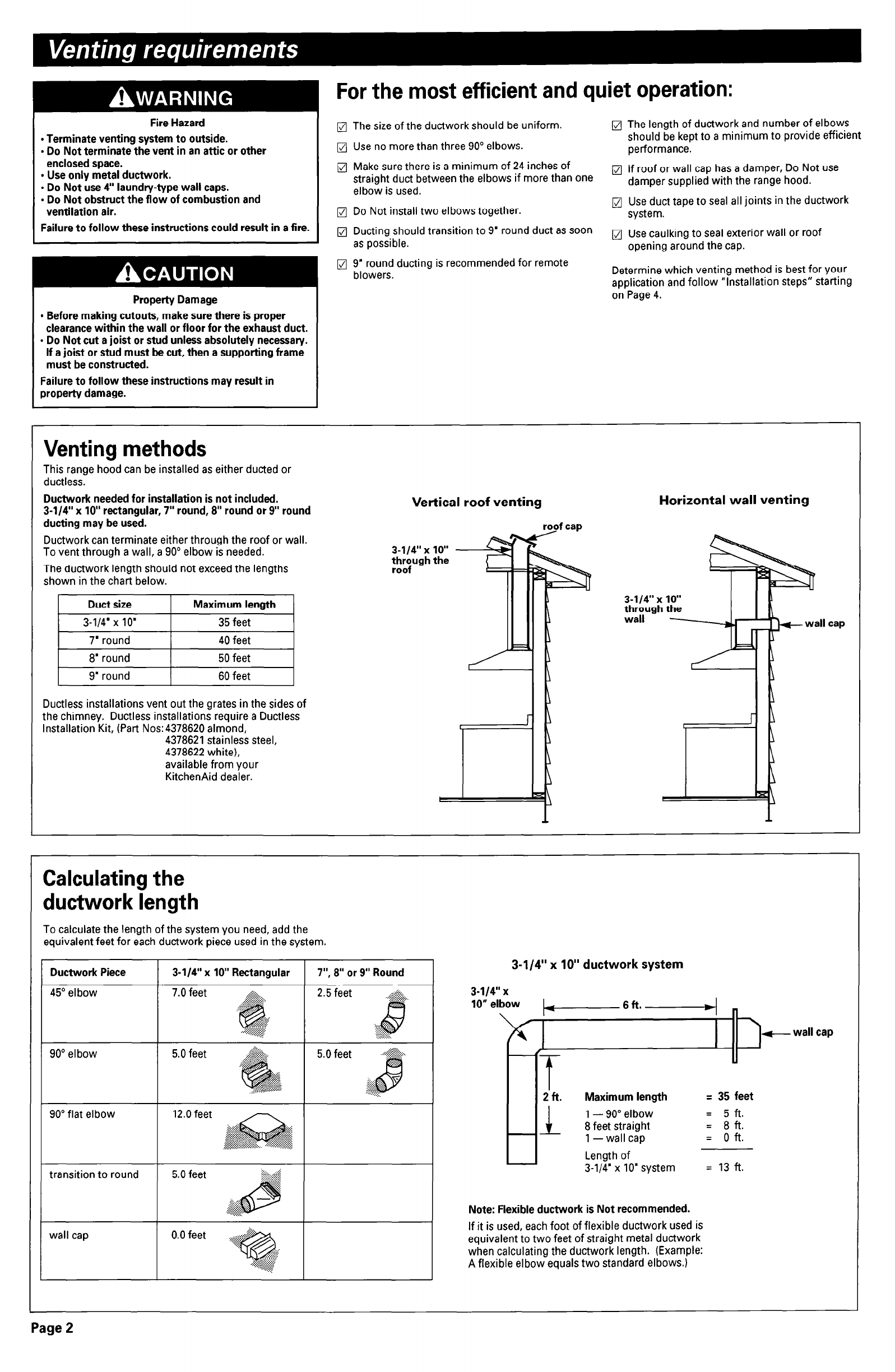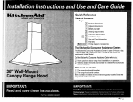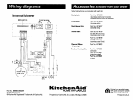
Fire Hazard
l
Terminate venting system to outside.
l
Do Not terminate the vent in an attic or other
enclosed space.
l
Use only metal ductwork.
l
Do Not use 4” laundry-type wall caps.
~
l
Do Not obstruct the flow of combustion and
ventilation air.
Failure to follow these instructions could result in a fire.
Property Damage
l
Before making cutouts, make sure there is proper
clearance within the wall or floor for the exhaust duct.
l
Do Not cut a joist or stud unless absolutely necessary.
If a joist or stud must be cut, then a supporting frame
must be constructed.
Failure to follow these instructions may result in
property damage.
For the most efficient and quiet operation:
q
The size of the ductwork should be uniform.
q
Use no more than three 90” elbows.
q
The length of ductwork and number of elbows
should be kept to a minimum to provide efficient
performance.
q
Make sure there is a minimum of 24 inches of
straight duct between the elbows if more than one
elbow is used.
q
Do Not install two elbows together.
q
Ducting should transition to 9’ round duct as soon
as possible.
q
9’ round ducting is recommended for remote
blowers.
q
If roof or wall cap has a damper, Do Not use
damper supplied with the range hood.
q
Use duct tape to seal all joints in the ductwork
system.
q
Use caulking to seal exterior wall or roof
opening around the cap.
Determine which venting method is best for your
application and follow “Installation steps” starting
on Page 4.
Venting methods
This range hood can be installed as either ducted or
ductless.
Ductwork needed for installation is not included.
3-l/4” x IO” rectangular, 7” round, 8” round or 9” round
ducting may be used.
Ductwork can terminate either through the roof or wall.
To vent through a wall, a 90” elbow is needed.
The ductwork length should not exceed the lengths
shown in the chart below.
Vertical roof venting
Horizontal wall venting
Duct size
Maximum length
3-l/4’ x 10’
35 feet
7’ round
40 feet
8’ round
50 feet
9’ round
60 feet
Ductless installations vent out the grates in the sides of
the chimney. Ductless installations require a Ductless
Installation Kit, (Part Nos: 4378620 almond,
4378621 stainless steel,
4378622 white),
available from your
KitchenAid dealer.
Calculating the
ductwork length
To calculate the length of the system you need, add the
equivalent feet for each ductwork piece used in the system.
Ductwork Piece
3-W’ x 10” Rectangular
7”, 8” or 9” Round
3-l/4” x 10” ductwork system
45” elbow
90” elbow
90” flat elbow
7.0 feet .$s ::....
..&!:;;.. 3-l/4” x
.A...::::..:.
2.5 feet ...sssky.
62
~~:+.:‘.~:::.
.: _
10” elbow
..:...-
. ..&f
>.., .::::..
..::::::::::::::*z
s:., ..:::,
. . . . . . . . . . . . ...<.
,:2$7
-.- . . . . . . . . . .
w wall cap
5.0 feet
.$:....
. . . . . . . ..>A
5.0 feet
..:::z:..
..<::::<<::*:p
.:~::<~;:y.”
I
..;.:.:.:..... ;:..
“1 -‘I
@
‘. .:a::::..
;:.
s:.::;.
_.<.’ ./A:.:
i &A::::::::::;;;
-:I@
.:.-.- ::.
F
. . . . . ..- . . . . .
,,:~.~~:~~~:~~~~:::.:~
:....... . . . . .
.-....... I
,.:.:.:.:.:..
2 ft.
Maximum length
= 35 feet
12.0 feet
1 - 90” elbow = 5ft.
::...>::;
;gz:i .,., ‘.:: ..:.,
. . . . . .
:~~~~~~~~
8 feet straight
= 8ft.
:.~.~~~::~::.:.. ‘X
:,::::+.~;g$$
-1
. . . . . . . . . . . . . . . . . .
1 -wall cap
= oft.
_
Length of
transition to round
wall cap
5.0 feet
;;.;..
,.. . . . . .
,-.- --.>>:.>:
. . . . . . . .
. . . . . .
. . . .
-=o
..:.. _ i -
.-.
:..............
_
. . . . . .
0.0 feet ,&+
~~~~ .g$<
@
. . . . . . . . . . . .
‘; ..;’
.:::::::::::::::::::::,
. . . . . . . . . . . . . . .
_
-.
3-l/4’ x 10’ system
= 13ft.
Note: Flexible ductwork is Not recommended.
If it is used, each foot of flexible ductwork used is
equivalent to two feet of straight metal ductwork
when calculating the ductwork length.
(Example:
A flexible elbow equals two standard elbows.)
Page 2









